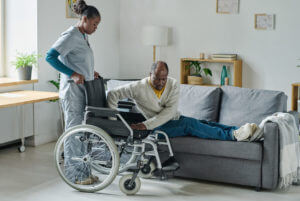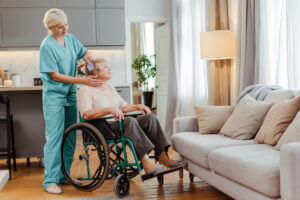Caring for a loved one in need of medical assistance at home can be a challenging experience. Whether it is recovery from surgery, managing chronic conditions, or supporting the elderly with their daily tasks, balancing their needs with your own life can feel overwhelming. This is where private nursing care steps in. Private nursing care
Read MoreHow In-Home Therapy Helps Disabled Loved Ones
Caring for a disabled person at home involves a unique set of challenges, as well as rewarding experiences. When tending to the needs of a loved one with a disability, families often face physical, emotional, and logistical hurdles. One solution that has proven to be highly effective and supportive is in-home therapy. Let us explore
Read MoreComfort Care Senior Services After Hospital Discharge
Transitioning from hospital care to home recovery can be a critical and challenging time for seniors and their loved ones. The right post-hospital care plan can significantly improve recovery outcomes, prevent readmissions, and ensure a high quality of life. Comfort care senior services are a compassionate and effective solution to help seniors maintain their health
Read MoreChoosing Trusted Home Health Services Near Me
When it comes to the well-being of yourself or your loved ones, finding trusted home health services near you is an essential and often overwhelming task. Whether you are navigating care for a parent recovering from surgery, seeking assistance for managing a chronic condition, or simply aiming to support a loved one’s ability to age
Read MoreEssential Guide to End-of-Life Care at Home
Caring for a loved one at the end of their life can be one of the most profound, emotional, and challenging experiences. Whether you are navigating medical decisions, managing their pain, or simply offering emotional support, the process can feel overwhelming. For many, providing end-of-life care at home is a deeply personal choice that allows
Read MoreFull-Time Care at Home: Tailored Support for Your Needs
When faced with the decision to care for a loved one who requires ongoing assistance due to age, illness, or disability, the question of whether full-time care at home could be right for your family often arises. With an increasing emphasis on personalized support and maintaining independence, more families are turning to in-home care as
Read MoreNavigating Challenges: Caring for a Disabled Person at Home
Caring for a disabled person at home is a profoundly rewarding yet extremely challenging job in which every decision carries weight and every detail matters. It involves making radical changes, not just to your home but also to your daily life, your mindset, and your priorities. Embracing this role means cultivating resilience, patience, compassion, and
Read MoreIn-Home Speech Therapy: Supporting Adult Stroke Patients
Stroke recovery is a challenging and deeply personal journey for individuals and their families. Among the many physical and cognitive challenges stroke survivors face, speech and language difficulties are some of the most common and impactful. For those who struggle with speaking, understanding, reading, or writing after a stroke, in-home speech therapy for adults offers
Read MoreThe Role of In-House Rehabilitation After a Stroke
Recovering from a stroke is one of the most challenging journeys anyone can face. Beyond the immediate medical interventions, the path toward recovery requires patience, perseverance, and, more importantly, a tailored rehabilitation plan. For many stroke survivors, in-house rehabilitation has become a vital component of their recovery process, offering targeted care in the comfort of
Read MoreWhat to Expect from In-Home Physical Therapy for Seniors
The physical challenges that come with aging can make daily life harder for seniors. Whether it is recovering from surgery, managing a chronic condition, or improving mobility, physical therapy is often a vital step in maintaining independence and quality of life. But for many seniors, traveling to a clinic can be difficult and inconvenient. That
Read More











